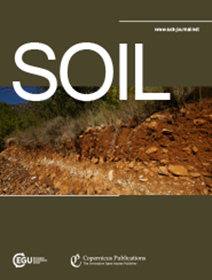高寒土壤中挥发性碳的有效性控制着土壤有机质分解的温度依赖性响应
IF 4.3
2区 农林科学
Q1 SOIL SCIENCE
引用次数: 0
摘要
摘要。高寒环境下土壤有机质分解受温度、基质质量等多种因素的影响。由于气候变化将对这两个因素产生影响,因此有必要提高我们的知识,例如,变暖将如何改变这些环境中的碳循环,以便更好地为未来条件(甚至在高山地区)的土壤管理做好准备。本研究通过为期一年的实验室孵化实验,探讨了增温和有机输入对高寒森林和牧场土壤中SOM分解的影响。土壤暴露在3种温度下(12.5°C、16.5°C和20.5°C),有和没有添加新鲜凋落草。虽然较高的温度加速了分解,但新鲜有机质的可用性起着更决定性的作用,特别是在富含木质素的森林土壤中。如果没有新鲜凋落物,SOM分解受到限制,这表明底物有效性与温度升高相结合对微生物活性的影响大于温度单独作用。森林土壤比牧场土壤表现出更大的碳损失,很可能是由于适应木质素分解的微生物群落。这些结果表明,气温上升与植被和有机输入的变化相结合,可以促进高寒土壤SOM的分解,并有可能将高寒土壤从碳汇转变为碳源。本文章由计算机程序翻译,如有差异,请以英文原文为准。
Availability of labile carbon controls the temperature-dependent response of soil organic matter decomposition in alpine soils
Abstract. Soil organic matter (SOM) decomposition in alpine environments is influenced by multiple factors including temperature and substrate quality. As climate change will have an impact on both factors, it is essential to improve our knowledge, how, e.g., warming will modify carbon cycling in these environments to better prepare soil management for future conditions, even in alpine regions. This study investigates how warming and organic inputs affect SOM decomposition in alpine forest and pasture soils through a one-year laboratory incubation experiment. Soils were exposed to three temperatures (12.5 °C, 16.5 °C and 20.5 °C), with and without the addition of fresh grass litter. While higher temperatures accelerated decomposition, the availability of fresh organic matter played a more decisive role, especially in the lignin-rich forest soil. Without fresh litter, SOM decomposition was limited, suggesting that substrate availability in combination with temperature increase plays a greater role in microbial activity than temperature alone. The forest soil exhibited greater carbon loss than the pasture soil, most likely due to microbial communities that are adapted to lignin decomposition. These results suggest that rising temperatures combined with changes in vegetation and organic inputs could enhance SOM decomposition and potentially transform the alpine soils from carbon sinks to sources.
求助全文
通过发布文献求助,成功后即可免费获取论文全文。
去求助
来源期刊

Soil
Agricultural and Biological Sciences-Soil Science
CiteScore
10.80
自引率
2.90%
发文量
44
审稿时长
30 weeks
期刊介绍:
SOIL is an international scientific journal dedicated to the publication and discussion of high-quality research in the field of soil system sciences.
SOIL is at the interface between the atmosphere, lithosphere, hydrosphere, and biosphere. SOIL publishes scientific research that contributes to understanding the soil system and its interaction with humans and the entire Earth system. The scope of the journal includes all topics that fall within the study of soil science as a discipline, with an emphasis on studies that integrate soil science with other sciences (hydrology, agronomy, socio-economics, health sciences, atmospheric sciences, etc.).
 求助内容:
求助内容: 应助结果提醒方式:
应助结果提醒方式:


